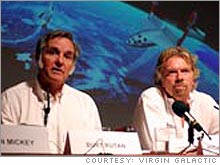 |
| Burt Rutan, left, the designer of the first privately-financed manned spaceship, and Richard Branson, who has licensed Rutan's design and plans to offer space trips to tourists in 2008. |
|
|
|
|
|
NEW YORK (CNN/Money) -
Forget the Russians and the Americans. The new space race is between the guys from Virgin Atlantic, Amazon.com, and PayPal.
The two-and-a-half years since the last manned NASA flight have seen great efforts by entrepreneurs who want to start providing flights for wealthy space tourists. (Click here for CNN.com's coverage of the space shuttle Discovery's flight.)
Virgin Atlantic won't be flying into space, but a sister company, Virgin Galactic appears to have an early lead, and hopes to offer sub-orbital flights as soon as 2008.
The company has a licensing agreement with aircraft designer Burt Rutan and Microsoft co-founder Paul Allen, who backed Rutan's effort to build the first privately-financed rocket to carry a man into space, SpaceShipOne. That ship made two sub-orbital trips last fall to win the $10 million X-Prize.
Virgin Galactic is now spending $21.5 million for use of the technology, and plans to spend $100 million to build five of a new version of the space craft, which should each be able to carry six or seven passengers, plus crew, into space.
The flights will be sub-orbital, only giving the passengers about seven minutes of weightlessness and the ability to see the darkness of space and the curve of the earth. The cost for the flight, along with several days of training before takeoff, is estimated to be $200,000.
The fact that the space craft is carried into the air underneath another plane before being launched in mid-air gives it cost savings and safety that can't be accomplished in a traditional ground-launched rocket, said Will Whitehorn, the president of Virgin Galactic.
Whitehorn said it should allow for a successful business model, with about 460 passengers the first year of operation, or about the number of people who have traveled in space since the first manned fight more than 40 years ago.
"We've now signed up 100 pioneer launch customers," said Whitehorn. "We have another 35,000 have registered who said they want to take a flight. We're going to take an entirely different view of leaving the planet's surface."
Competition
But Whitehorn acknowledges his firm isn't the only one making such an effort.
Jeff Bezos, founder of online retailer Amazon.com (Research), has formed Blue Origin LLC, which is also working on the design of a spacecraft and has already bought 165,000 acres of land in West Texas for a spaceport.
Elon Musk, who created the online payment system PayPal, formed Space Exploration Technologies, which is now working on unmanned rocket launches as a way to eventually carry people into space for a fraction of current costs.
Musk and Whitehorn both believe that private competition will bring down the cost of space flight to the point where it is soon affordable for folks who can't spend six figures.
"It is despairing to consider that the cost and reliability of access to space have barely changed since the Apollo era over three decades ago. Yet in virtually every other field of technology, we have made great strides in reducing cost and increasing capability," said Musk in testimony before Congress. He blamed lack of new entrants into the field of space flight for the current high costs.
But Musk's firm, known as SpaceX, is concentrating now on achieving unmanned missions carrying commercial payloads into orbit. Once it has a track record, it hopes to be able to carry as many as five passengers into orbit on a rocket it is now developing. But it has no time frame for those flights.
Whitehorn is careful not to directly criticize NASA for the lack of commercial flights, but he believes the agency's structure has stuck it with old and very expensive spacecraft.
"[The shuttle] is technologically a very 70s and 80s product," he said. "Things have come along leaps and bounds since then."
Space travel agency
So far the only space tourists have been American Dennis Tito and South African Mark Shuttleworth. Both underwent six months of training and paid $20 million to ride in Russian-built Soyuz rockets to the International Space Station. Those trips were arranged by Space Adventures, an Arlington, Va., firm that acts as a tour operator for space trips. It's arranged a third such trip for American Greg Olsen, set for this October.
It has also started to accept deposits from potential customers who want to pay just over $100,000 for a sub-orbital flight. Space Adventures President Eric Anderson said he has collected about $3 million from 150 customers, and that he'll be either the first or among the first to arrange for such flights. He also believes only a few days of training for passengers will be needed for a flight.
"Virgin will spend hundreds of millions to build SpaceShipTwo," he said. "We plan to have more than one kind of sub-orbital vehicle. We've got agreements with several different vehicles. I think over the next five to 10 years there will be many different choices."
But Anderson admits that whoever is first will have an price advantage.
"Once the price is above $100,000, it's for the elite affluent," said Anderson. "But if someone is offering flights right away and everyone else is talking about flying in five or six years, they'll be able to charge a big premium. People aren't going to want to wait."
One of Anderson's customers is Per Wimmer, a Danish investment adviser working for a London investment bank. He's already paid his $100,000 to be among the first customers Space Adventures will put on a sub-orbital flight, and he's sticking with the firm despite Virgin's plans.
"There's always a premium to pay to be a first," he said. "I'd get out tomorrow if I could."
For more on plans for space tourism, click here.

|